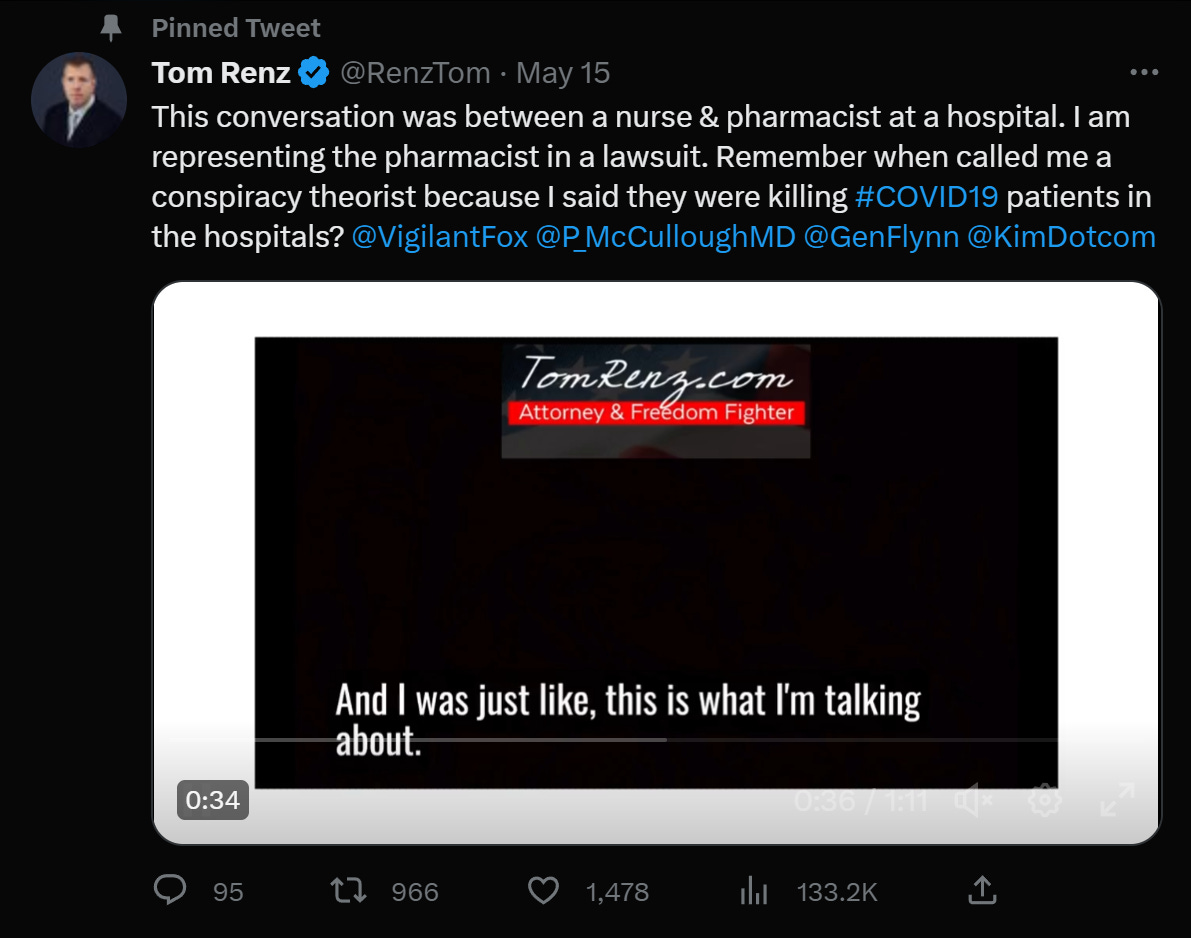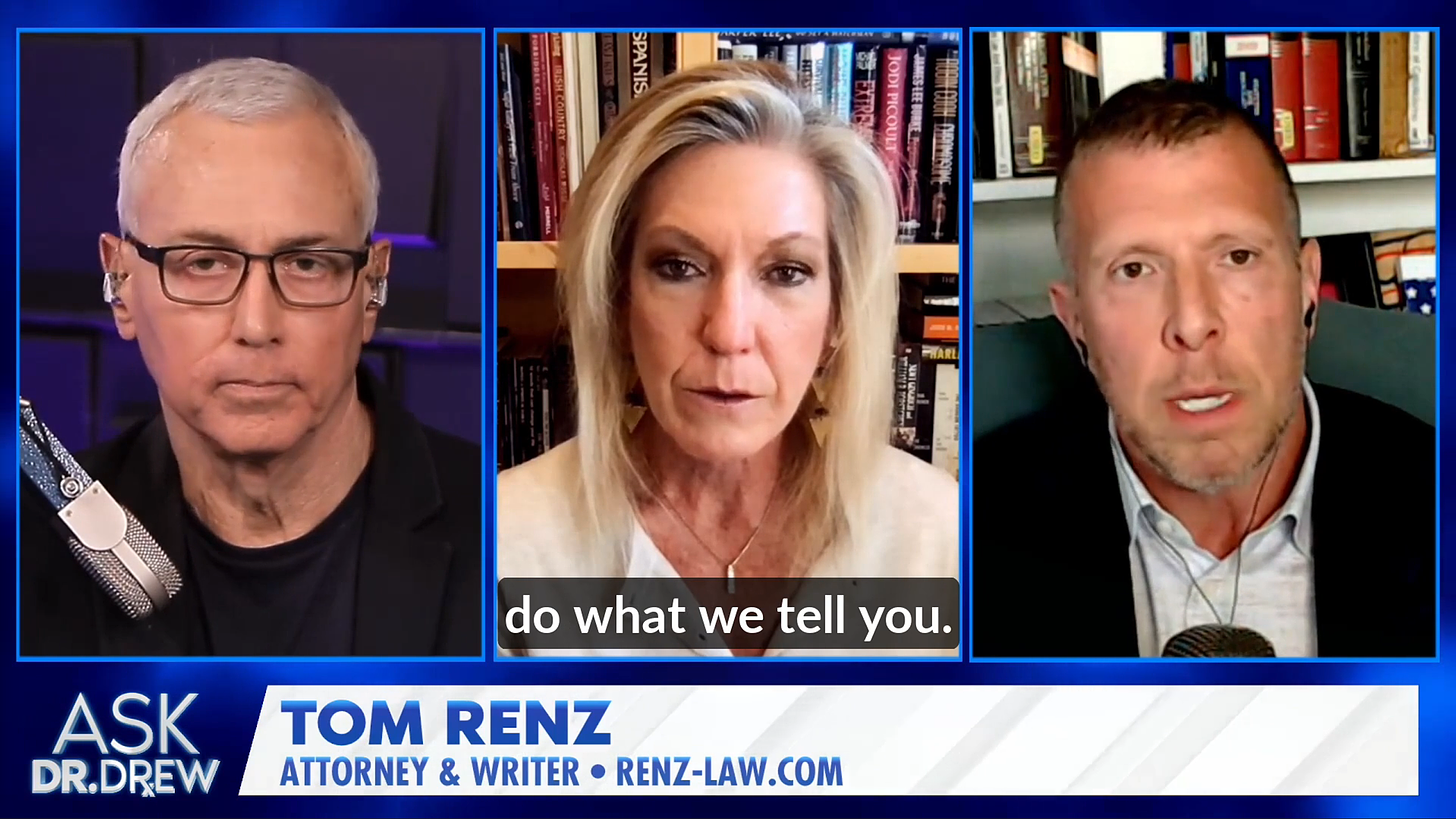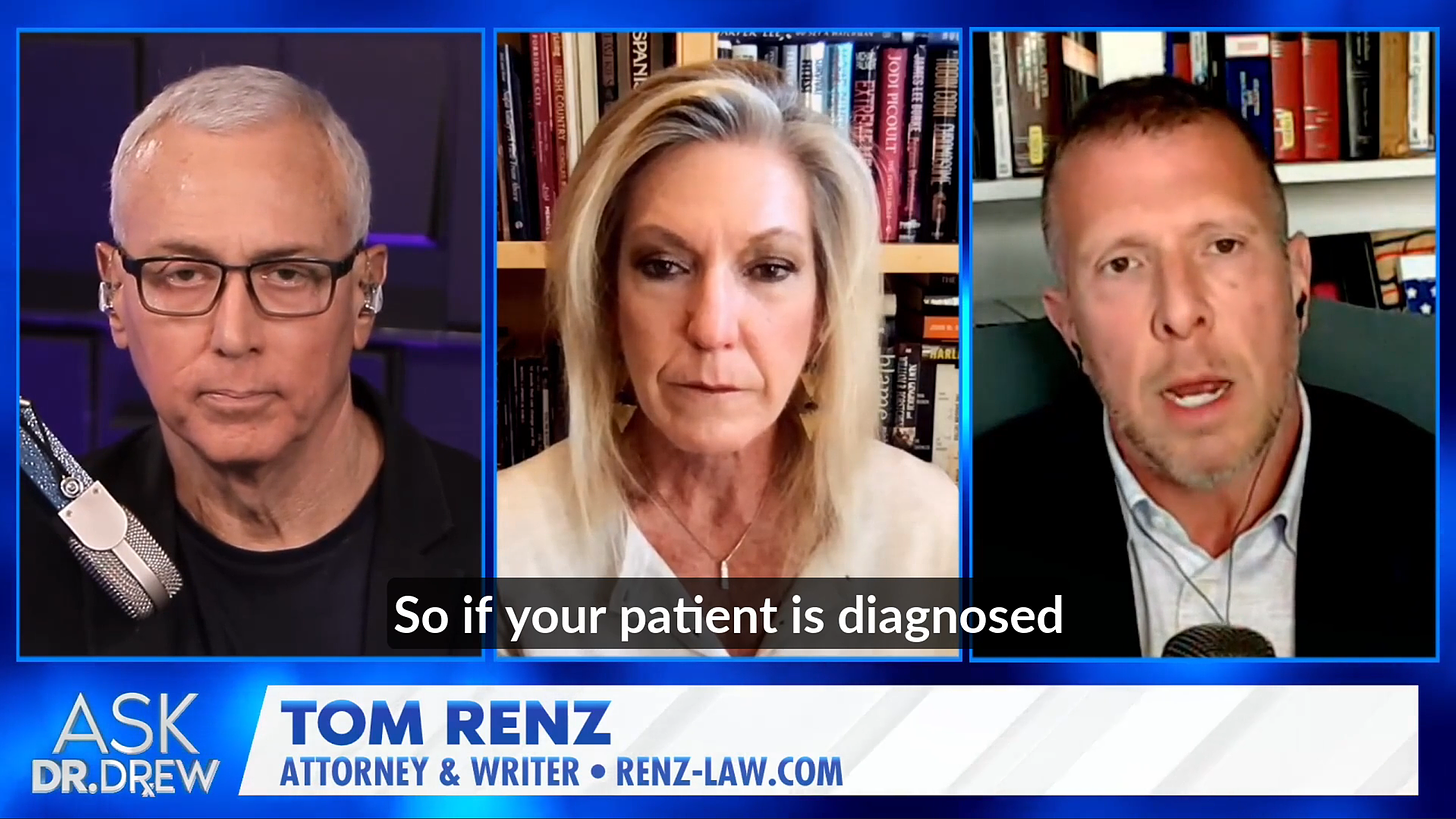Killing Floor: Firsthand Witness Attests Hospital Deliberately Hastened the Deaths of COVID Patients
Killing Floor: Firsthand Witness Attests Hospital Deliberately Hastened the Deaths of COVID Patients
“They [patients] put the phone on speaker; the doctors didn’t know it. And they were in there screaming at [the patients], you’re going to die if you don’t do what we tell you.”
Originally Published on DailyClout
“We incentivized murder,” attested attorney Tom Renz on the Dr. Drew show Wednesday (5/17/23). “What we did was we created a financial incentive — not if you get better from COVID, you get a bonus. It’s if you die from COVID, you get a bonus.”
Mr. Renz was invited after releasing an audio recording between a pharmacist and a nurse discussing excessive morphine administration on a particular hospital floor on his Twitter feed.

Morphine is a potent opioid analgesic, meaning it is primarily used for pain relief. Morphine affects the central nervous system (CNS), which can lead to respiratory depression and then hypoxia (not enough oxygen in the blood). Therefore, if one receives an excessive amount of morphine, it opens the door for more invasive measures like a mechanical ventilator.
Here’s the transcript of that recording:
PHARMACIST: “I didn’t even ask for this transfer [to this floor]. But because these are the politics, if you complain or stir, they’re going to shut you up and move you out.”
NURSE: “Keisha said, are we hospice care — or what’s the deal? She said that Dr. Steagall says this floor is going to be his patients. So we’re — we’re killing the patients [on] this floor. Because what he’s asking us — well, other floors don’t want to do it.”
PHARMACIST: “Yeah, I couldn’t sleep at night. And then when that nurse practitioner — when you got that assignment to do the morphine, and you’re like, she doesn’t need it. And I was just like, this is what I’m talking about.”
NURSE: “They’re okay. They’re comfortable. We can tell when they’re in pain. We can tell when they’re agitated. We can tell when they are whatever. That doesn’t make that you keep giving them medication just to knock them out. Cause, apparently, that’s what you are doing.”
PHARMACIST: “I remember that day, you were like, you got the other nurses to come in and say — and I’m just like, I know. That’s what they’re doing.”
Adrienne — a clinical pharmacist of 18 years and the whistleblower behind that recorded conversation — revealed more details on what she saw and heard to attorney Tom Renz.

“How did you know that there were people hastening death?” asked Attorney Renz.
“I know that because I spoke to one of the nurses one morning when I was opening on the floor,” Adrienne answered. “I work on the unit. And he [the nurse] was totally upset because the night nurse ‘didn’t do her job.’ And I questioned him. I said, ‘Why are you so mad? What do you mean she didn’t do her job.’ And he basically said that she didn’t go up on the morphine drip and take care of business. Now he has to do it. And he has to take care of it.”
Attorney Renz unfolded more details to listeners. “My client [Adrienne] asked for a religious accommodation that would basically exempt her from having to deal with blanket orders to murder people. That’s my words, not hers. The hospital ignored her but then said no.”
“Let’s think about that,” he proposed. “Now, we’ve been hearing rumors and all sorts of stuff for quite some time that the hospitals were denying ivermectin, denying hydroxychloroquine, denying early treatment, denying this, denying that. But we now have a firsthand witness who was ignored and ostracized for requesting that hospitals take steps to not hasten death. Or at least that she not be directly required to do that in a blanket way.”
“Folks, I’m going to tell you that it’s my belief that this was coordinated on a very high level from a lot of places,” expressed Mr. Renz. “And I think we have some real questions to ask ourselves when we have a doctor of pharmacy with the clinical experience that Adrienne has who’s saying to them, hey, what you’re doing is hastening death — and they basically blow it off. There’s an issue here.”
Attorney Tom Renz shared with doctors Drew Pinsky and Kelly Victory that he had “probably a thousand people” tell him a similar “horror stories.”

“I had probably a thousand people that I talked to over time begging me for help, saying the hospital won’t let us make decisions. Do you know how many instances I had of people calling me and telling me that my brother, sister, loved one is in the hospital?” he rhetorically asked.
“They [patients] put the phone on speaker; the doctors didn’t know it. And they were in there screaming at [the patients], you’re going to die, you’re going to die, you’re going to die if you don’t do what we tell you.”
Now, why would hospitals do this?
It seems almost unthinkable that hospitals would deliberately harm patients — at least under normal conditions. But as Mr. Renz detailed, there were financial incentives that paid hospitals more money for bad outcomes, not good outcomes.

“So if your patient is diagnosed and called a COVID patient, [you get more money]. Then, if your patient goes through certain treatment protocols, remdesivir, ventilator, et cetera, et cetera, each one of those, you’re going to get an additional amount of money,” shared Mr. Renz.
Dr. Paul Marik, one of the world’s most published critical care doctors, has testified that hospitals received a 20% bonus on the entire hospital bill from the Federal government just for administering remdesivir to a COVID patient.

Attorney Renz continued. “Then, on top of that, we throw in this immunity thing. We say, well, and not only do you get a big incentive if the patient dies, but we’re also going to make it so that you can’t be sued for killing them even if it looks like you did. You have to actually show willfulness — [a] willfulness kind of intent. It has to be intentional.”
“So they made the bar so high that it’s nearly impossible,” he lamented. “And you throw in the [financial incentive] — we incentivized murder, to my mind.”
If you or a loved one experienced a similar situation, please leave a comment and share this post. A few anecdotes are one thing, but when hundreds or thousands of people share the same story, that is no longer anecdotal evidence — that is a troubling signal for atrocities against humanity.


















